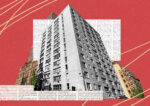Michael Stern’s massive apartment project in Two Bridges has hit a roadblock, leaving next steps for the proposed 80-story, 500,000-square-foot tower unclear.
Stern’s JDS Development Group lost an appeal last week to move forward with merging zoning lots without the consent of an LLC that holds the long-term ground lease on the site at 247 Cherry Street, court records show.
A ruling from the New York Supreme Court said Little Cherry LLC, which has more than 20 years remaining on its ground lease, had not waived its right to consent to future enlargements of the combined zoning lot when it approved the merger of two other lots in a 2008 agreement.
The agreement approving the merger of Lots 15 and 76 noted that one of the lots may be expanded, but did not give permission to a future zoning lot merger.
JDS recently sought to expand its project onto an adjacent parcel, Lot 70, but Little Cherry sued, claiming that it had not granted permission. An appellate court ruled in favor of Little Cherry in 2019, saying the lessee was a party of interest and could have a say in how the land was used.
At the time, the LLC had 25 years left on its ground lease at 247 Cherry Street, where JDS had planned to construct as many as 660 units above the one-story building and neighboring senior residence on the site. The court also ordered that Little Cherry’s status as a party of interest could not be relitigated.
The New York Supreme Court also ruled in favor of Little Cherry and New York Community Bank in April 2021, saying JDS could not proceed with its project without consent to the zoning lot merger. The court implemented an injunction to prevent the project from moving forward without such approval, which the plaintiffs had yet to grant.
JDS appealed last year, claiming that the injunction crippled the project by banning all development or construction on Lot 76 and the adjoining property.
But in the decision last week, the court called JDS’ claim “unavailing” because it can proceed with its development without requiring a zoning lot merger or affecting Little Cherry’s property rights, the court said.
It wasn’t immediately clear what the ruling means for JDS’ project. Neither Stern nor attorneys representing his firm responded when reached for comment. Attorneys representing Little Cherry declined to comment.
The Two Bridges development has faced numerous legal challenges in recent years.
Read more



The city granted approval in 2018 to JDS, L+M Development, CIM Group and Starrett Corporation to build four rental towers at 247 Cherry Street, 260 South Street and 259 Clinton Street. The projects would bring almost 2,800 units to the Lower East Side, roughly a quarter of them income-restricted.
Residents and community groups filed a petition in 2019 against various city departments, claiming the project required a thumbs up from the City Council. The Council sued as well, claiming the developers needed its approval to modify the Two Bridges large-scale development plan that was put in place in 1972.
A state judge agreed that the projects had to go through the city’s land use review, which would have substantially reduced the projects and required more affordability.
But the developers and the de Blasio administration beat back the challenge in 2021 when the Appellate Division ruled in their favor and the state’s highest court declined to hear an appeal.
When it seemed like the project’s legal troubles were over, Council member Christopher Marte and local residents of the Lower East Side and Chinatown filed a lawsuit last month against the city and developers behind the project, arguing that construction of the high-rise towers would create further environmental and health issues for those already contending with effects from 9/11.
The suit cited the so-called green amendment, a constitutional right which passed by a ballot referendum last year and gives state residents the right to clean air and a healthy environment.
The Starrett Corporation sold its site at 259 Clinton Street in September to Gary Barnett’s Extell Development for roughly $100 million. The site is expected to be developed into a 61-story tower with as many as 765 units.
L+M and CIM sold their site at 260 South Street in April to developer Joseph Chetrit for $78 million. Plans were filed last year for a pair of 73-story towers spanning 1.3 million square feet and consisting of 1,300 units. Chetrit, however, appears to be eyeing 64- and 70-story buildings on the site.
